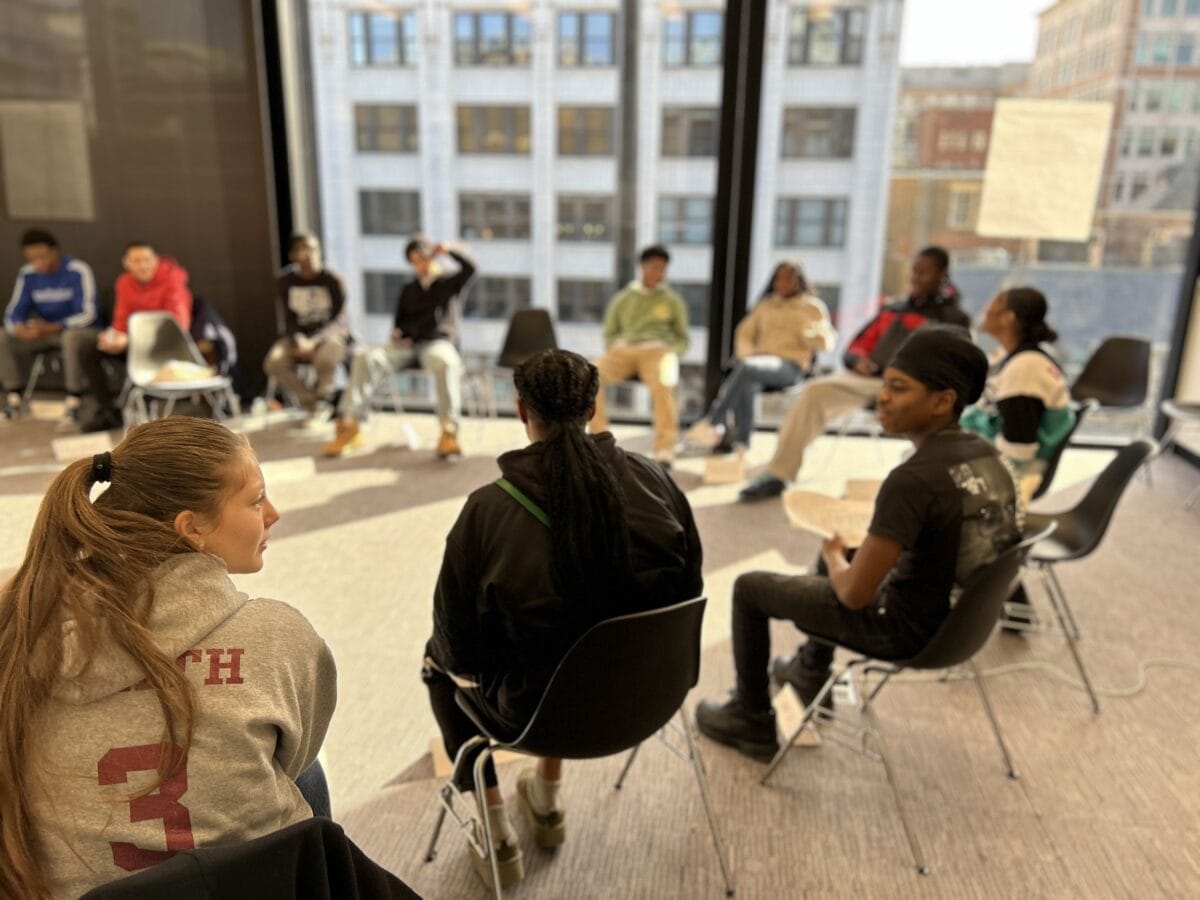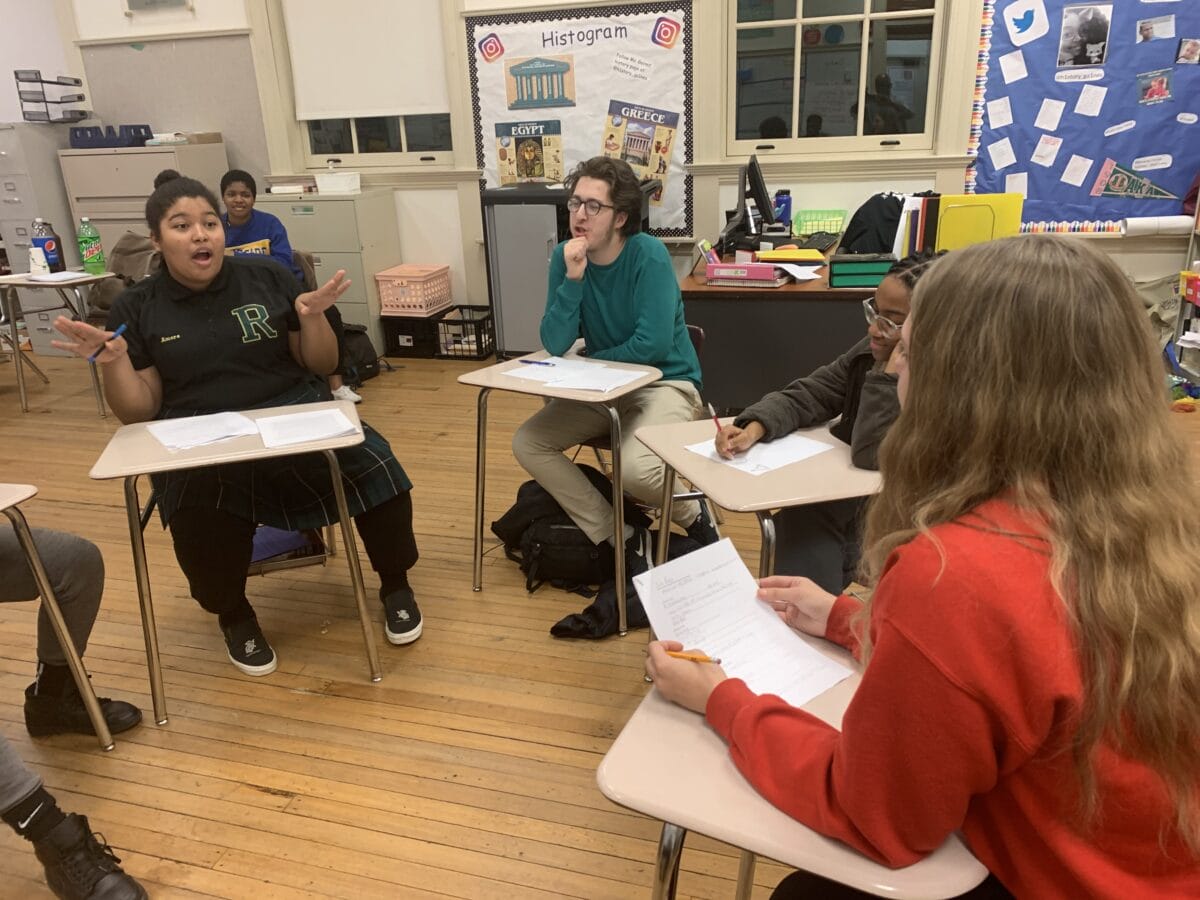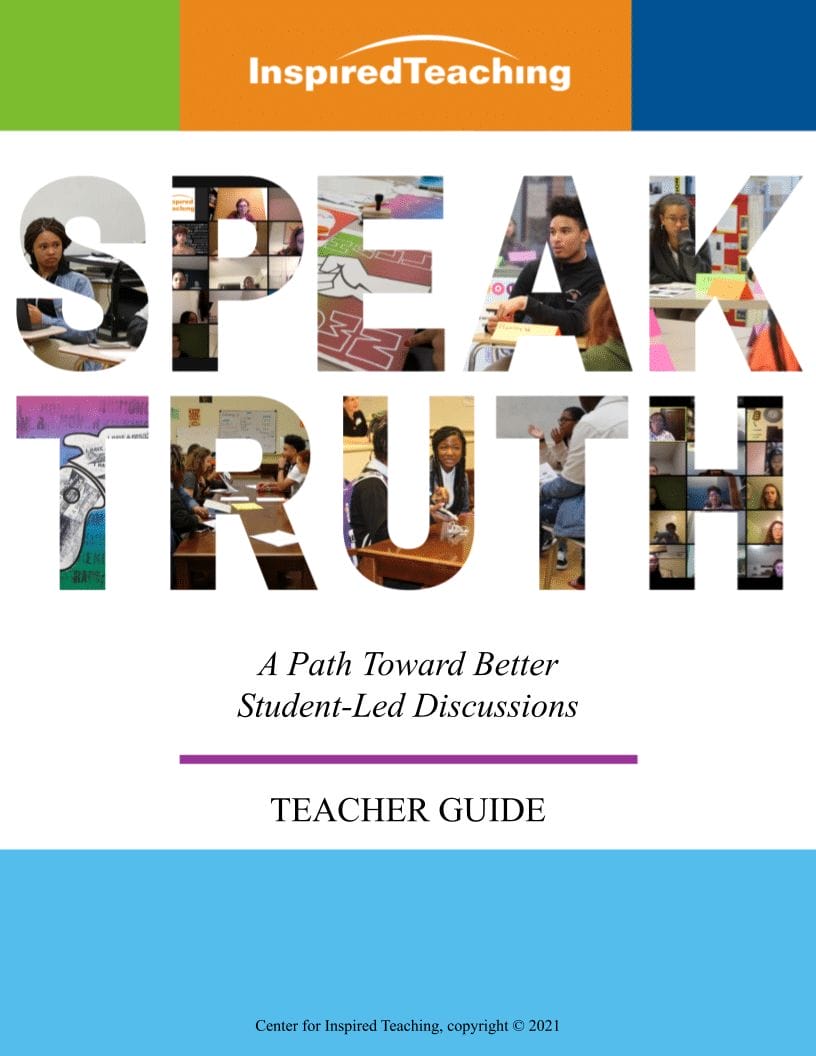Speak Truth
How can we hope for a better future if our children aren’t learning how to talk to each other?
Young people want to learn how to engage across differences with curiosity and respect. School can, and should, be the place where this happens.
Through student-led conversations, Speak Truth participants learn to discuss current, controversial topics in a productive and respectful manner. These thought-provoking conversations teach students to defend their stances on myriad issues and help them develop and recognize the power of their voices. As a national model for civic discourse and dialogue among young people, Speak Truth seminars have the power to shape a generation of socially conscious future leaders and citizens who can build a better future for us all.
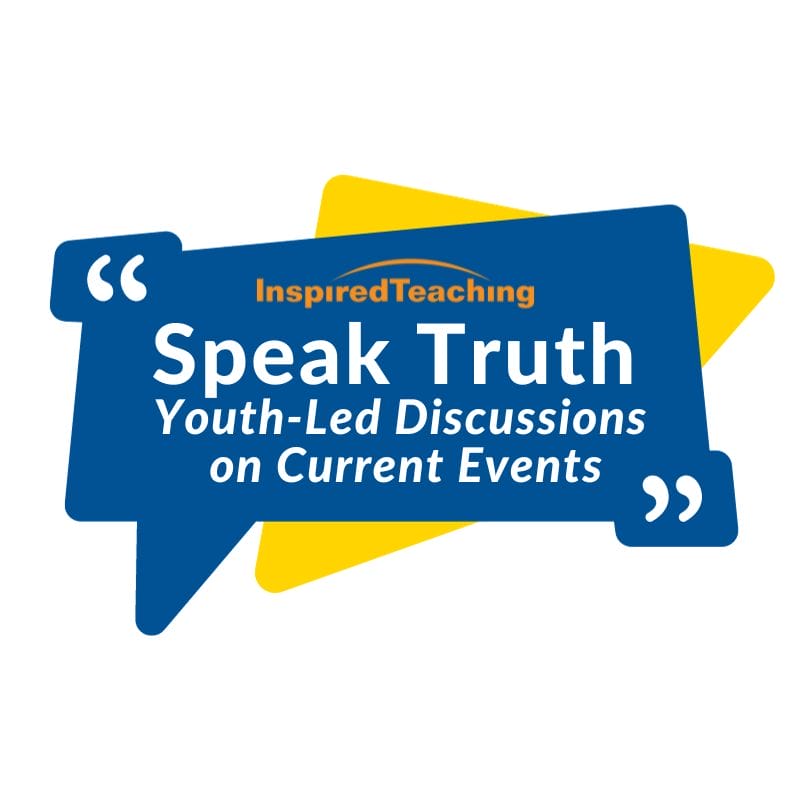
In school year 24-25, hundreds of students tackled current, complex, and controversial topics, such as lowering the voting age, school safety, criminal justice reform, and student well-being, with curiosity and respect for one another. Want to be part of the experience this year? Sign up today to receive regular updates about upcoming events, session topics, and opportunities to facilitate.
Want to become a Speak Truth Ambassador? During the 2025-2026 school year, Inspired Teaching will work closely with a select group of high school students in Washington, DC to lead regular Speak Truth sessions. Speak Truth Ambassadors will gain leadership, facilitation, and public speaking skills and have the opportunity to meet with and learn from peers across the District.
Please email Brady Maiden with “Speak Truth Ambassador” in the subject line if you’re interested: brady@inspiredteaching.org
Read the issues of Hooray For Monday below for more insight into recent Speak Truth sessions and how, as a model of the Inspired Teaching Approach in action, the program addresses each of the 5 Core Elements.
Speak Truth offers a first-hand look at learning centered on student voice and expertise. Adults are invited to observe and learn. These posts offer additional insight into what you can expect at a Speak Truth session.
Teachers: Bring Speak Truth to Your School
Young people care about issues affecting them and the world around them. Their concerns don’t always line up with the curriculum, and teachers don’t always have the time, tools, or resources to explore their students’ interests. Yet we know elevating youth voices is critically important not only for students’ well-being but for their development as problem-solvers and future leaders. The Speak Truth model presented in this Guide offers a way to bring meaningful student-led conversations into the classroom. Whether you host a Speak Truth session once a quarter, once a week, or every day, you will be creating a valuable space for learning where young voices and curiosity can grow.
Standards Addressed
Speak Truth meets the OSSE standards for community service in that it is “1. unpaid and 2. provides a societal benefit.” The societal benefit comes in the form of students teaching and learning from one another about critical issues in their lives and learning how to speak across differences – a critical need in our society. Speak Truth events are student-led and are designed so that every single participant engages in the discussion. Speak Truth also meets the DCPS criteria for community service activities that involve advocacy. After every Speak Truth discussion, participants use what they have learned from one another to engage in outreach to “influence citizens and policymakers to change their behavior, encourage action, and/or increase awareness around a community need.” The particulars of this action are dependent on the topics being discussed.
Common Core College and Career Readiness Anchor Standards for Language
Conventions of Standard English:
CCSS.ELA-LITERACY.CCRA.L.1 Demonstrate command of the conventions of standard English grammar and usage when writing or speaking.
Knowledge of Language:
CCSS.ELA-LITERACY.CCRA.L.3 Apply knowledge of language to understand how language functions in different contexts, to make effective choices for meaning or style, and to comprehend more fully when reading or listening.
Vocabulary Acquisition and Use:
CCSS.ELA-LITERACY.CCRA.L.6 Acquire and use accurately a range of general academic and domain-specific words and phrases sufficient for reading, writing, speaking, and listening at the college and career readiness level; demonstrate independence in gathering vocabulary knowledge when encountering an unknown term important to comprehension or expression.
Common Core College and Career Readiness Anchor Standards for Writing
Text Types and Purposes:
CCSS.ELA-LITERACY.CCRA.W.1 Write arguments to support claims in an analysis of substantive topics or texts using valid reasoning and relevant and sufficient evidence.
Production and Distribution of Writing:
CCSS.ELA-LITERACY.CCRA.W.4 Produce clear and coherent writing in which the development, organization, and style are appropriate to task, purpose, and audience.
CCSS.ELA-LITERACY.CCRA.W.6 Use technology, including the Internet, to produce and publish writing and to interact and collaborate with others.
Research to Build and Present Knowledge:
CCSS.ELA-LITERACY.CCRA.W.7 Conduct short as well as more sustained research projects based on focused questions, demonstrating understanding of the subject under investigation.
CCSS.ELA-LITERACY.CCRA.W.8 Gather relevant information from multiple print and digital sources, assess the credibility and accuracy of each source, and integrate the information while avoiding plagiarism.
CCSS.ELA-LITERACY.CCRA.W.9 Draw evidence from literary or informational texts to support analysis, reflection, and research.
Common Core College and Career Readiness Anchor Standards for Speaking and Listening
Comprehension and Collaboration:
CCSS.ELA-LITERACY.CCRA.SL.1 Prepare for and participate effectively in a range of conversations and collaborations with diverse partners, building on others’ ideas and expressing their own clearly and persuasively.
CCSS.ELA-LITERACY.CCRA.SL.2 Integrate and evaluate information presented in diverse media and formats, including visually, quantitatively, and orally.
CCSS.ELA-LITERACY.CCRA.SL.3 Evaluate a speaker’s point of view, reasoning, and use of evidence and rhetoric.
Presentation of Knowledge and Ideas:
CCSS.ELA-LITERACY.CCRA.SL.4 Present information, findings, and supporting evidence such that listeners can follow the line of reasoning and the organization, development, and style are appropriate to task, purpose, and audience.
CCSS.ELA-LITERACY.CCRA.SL.5 Make strategic use of digital media and visual displays of data to express information and enhance understanding of presentations.
CCSS.ELA-LITERACY.CCRA.SL.6 Adapt speech to a variety of contexts and communicative tasks, demonstrating command of formal English when indicated or appropriate.
Common Core College and Career Readiness Anchor Standards for Reading
Key Ideas and Details:
CCSS.ELA-LITERACY.CCRA.R.1 Read closely to determine what the text says explicitly and to make logical inferences from it; cite specific textual evidence when writing or speaking to support conclusions drawn from the text.
CCSS.ELA-LITERACY.CCRA.R.3 Analyze how and why individuals, events, or ideas develop and interact over the course of a text.
Craft and Structure:
CCSS.ELA-LITERACY.CCRA.R.6 Assess how point of view or purpose shapes the content and style of a text.
Integration of Knowledge and Ideas:
CCSS.ELA-LITERACY.CCRA.R.7 Integrate and evaluate content presented in diverse media and formats, including visually and quantitatively, as well as in words.
CCSS.ELA-LITERACY.CCRA.R.8 Delineate and evaluate the argument and specific claims in a text, including the validity of the reasoning as well as the relevance and sufficiency of the evidence.
CCSS.ELA-LITERACY.CCRA.R.9 Analyze how two or more texts address similar themes or topics in order to build knowledge or to compare the approaches the authors take.
Range of Reading and Level of Text Complexity:
CCSS.ELA-LITERACY.CCRA.R.10 Read and comprehend complex literary and informational texts independently and proficiently.
College, Career, and Civic Life (C3) Framework for Social Studies State Standards
| Dimension 1: Developing Questions and Planning Inquiries | Dimension 2: Applying Disciplinary Tools and Concepts | Dimension 3: Evaluating Sources and Using Evidence | Dimension 4: Communicating Conclusions and Taking Informed Action |
|---|---|---|---|
| Developing Questions and Planning Inquiries | Civics | Gathering and Evaluating Sources | Communicating and Critiquing Conclusions |
| Economics | |||
| Geography | Developing Claims and Using Evidence | Taking Informed Action | |
| History |
Collaborative for Academic, Social, and Emotional Learning Competencies
Self-Awareness: The abilities to understand one’s own emotions, thoughts, and values and how they influence behavior across contexts. This includes capacities to recognize one’s strengths and limitations with a well-grounded sense of confidence and purpose.
Self-management: The abilities to manage one’s emotions, thoughts, and behaviors effectively in different situations and to achieve goals and aspirations. This includes the capacities to delay gratification, manage stress, and feel motivation and agency to accomplish personal and collective goals.
Social awareness: The abilities to understand the perspectives of and empathize with others, including those from diverse backgrounds, cultures, and contexts. This includes the capacities to feel compassion for others, understand broader historical and social norms for behavior in different settings, and recognize family, school, and community resources and supports.
Responsible decision-making: The abilities to make caring and constructive choices about personal behavior and social interactions across diverse situations. This includes the capacities to consider ethical standards and safety concerns, and to evaluate the benefits and consequences of various actions for personal, social, and collective well-being.
Relationship skills: The abilities to establish and maintain healthy and supportive relationships and to effectively navigate settings with diverse individuals and groups. This includes the capacities to communicate clearly, listen actively, cooperate, work collaboratively to problem solve and negotiate conflict constructively, navigate settings with differing social and cultural demands and opportunities, provide leadership, and seek or offer help when needed.
OSSE 2024-2025 Updated SEL Standards
Competency 3: Social and Cultural Awareness
SCA.9-11.1 Recognizes the effects of words and actions on others’ emotions, including how
one’s own words and actions affect others’ words and actions
SCA.9-11.3 Demonstrates more than one positive way to express understanding of differing
perspectives
SCA.9-11.4 Articulates verbally or in writing an experience that demonstrates the
importance of valuing and learning from the perspective of others
SCA.9-11.8 Engages in different settings with appropriate norms that show sensitivity to and
appreciation of the culture, values and identities of others
SCA.9-11.9 Reflects on one’s own beliefs relative to different familial and societal norms
Competency 4: Relationship Skills
RS.9-11.1 Models appropriate communication skills (e.g., empathic listening, compassion,
reflective language) that honor cultural competency, relationships and safety
RS.9-11.9 Demonstrates listening and speaking skills to help prevent and resolve conflicts
Competency 5: Decision-Making and Agency
DMA.9-11.1 Demonstrates curiosity and openmindedness
Past Seminars
June 21, 2023: The First Step: Film Screening & Discussion
Students gathered at MLK Library in Washington, DC, to watch “The First Step,” a film exploring the behind-the-scenes machinations of passing a criminal justice reform bill in 2018. Student participants facilitated conversations on community, politics, and understanding, alongside an engaging Q&A with the film’s director and producer.
June 1, 2023 at E.L. Haynes High School
Students participated in lively, respectful discussion on the below topics, which they chose.
Raise your standards, ladies. This topic will discuss the pros and cons of setting standards for relationships in high school, especially from the young woman’s perspective.
Student-Teacher boundaries. This topic will examine the boundaries that exist or should exist in a healthy teacher-student relationship and what happens when these boundaries are violated.
Should kids vote? This discussion will examine the pros and cons of lowering the voting age to 16 and what that would mean for our laws and democracy.
School shootings. We will examine how the topic of school shootings affects our community and what we can do to avoid damage that results when someone is killed by guns at school.
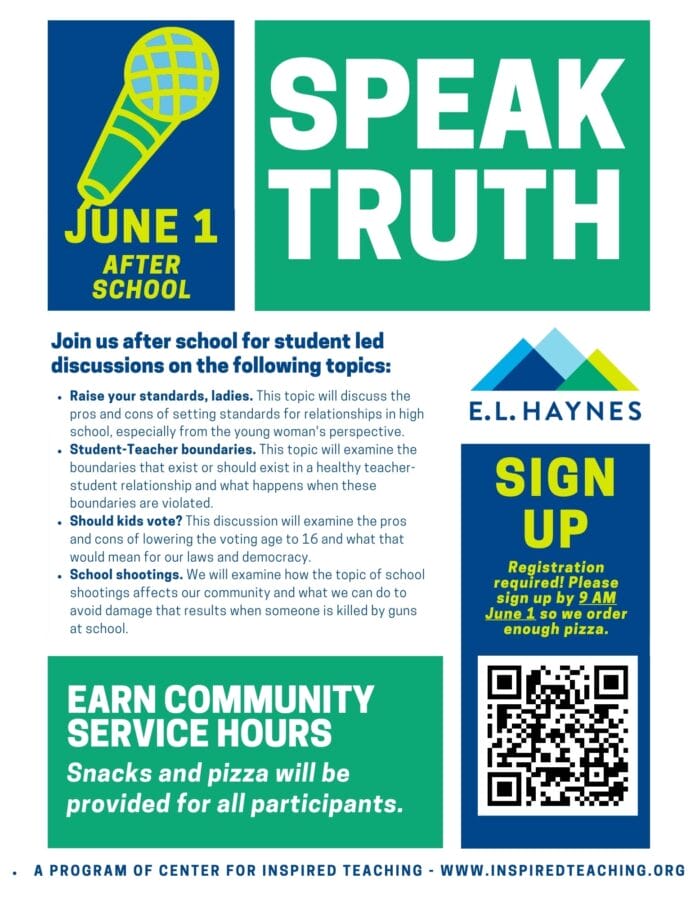
May & June 2023: The Future of School Virtual Series
High school students from the DC area and across the nation participated in a series of virtual Speak Truth events focused on the rise of artifical intelligence and what the future of school may look like. The series was held Thursdays, May 25, June 1, 8, and 15.
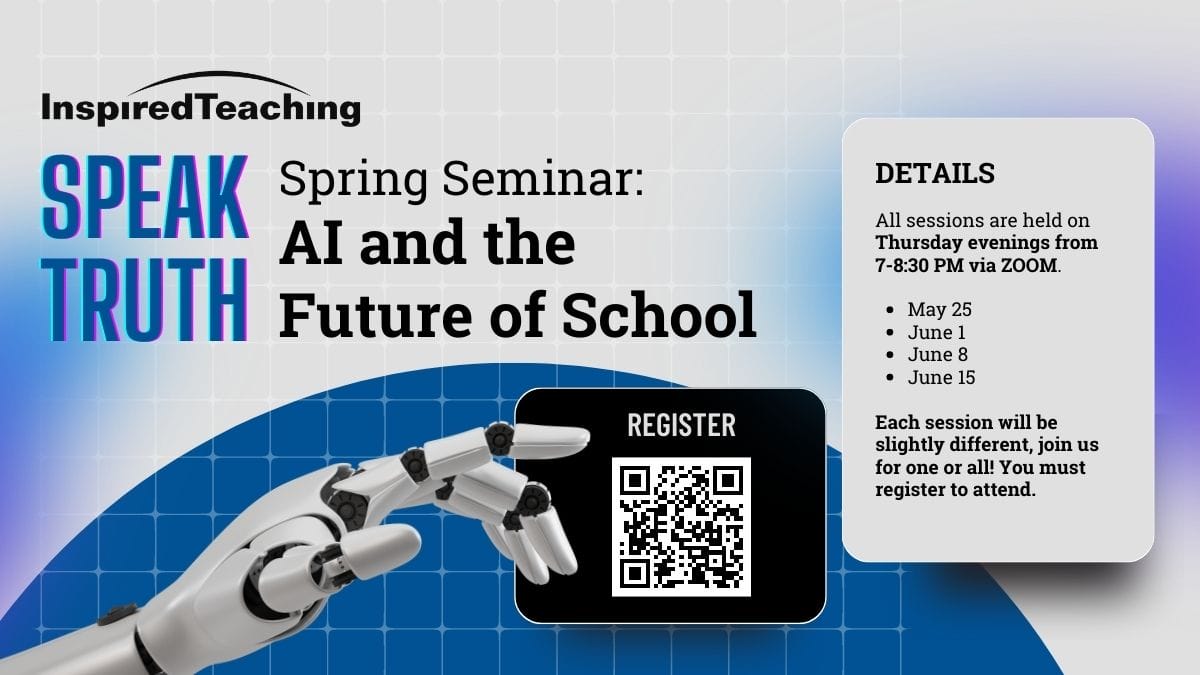
January 2023: Talking Across Dividing Lines
In January, we hosted an online session featuring guest speaker Helanius J. Wilkins, choreographer, performance artist, and changemaker. The session focused on how and why to engage with people whose experiences, perspectives, and opinions differ from our own and included a deep exploration of the relationship between community and belonging. Watch a clip of that discussion here.
May 31, 2022 at EL Haynes High School
Dozens of students participated in this in-person event, which focused on four topics: Don’t Touch My Hair; Immigration & Deportation; Gotta Catch Em’ All; and Violence in School. The sessions were held in partnership with the school’s Intro to Black Law and LULAC after-school clubs. During the Violence in School discussion, student-facilitators led with questions such as: What does solidarity look like to you? Why do we think there is racial tension in school? How do we relate to each other as students of color?
May 17, 2022 Virtual Seminar
The Pros and Cons of the High School Community Service Requirement
September 2, 2021 Virtual Seminar
The Purpose of Higher Education
• How to Find Your Path After School
September 23, 2021 Virtual Seminar
Strengthening the Speak Truth Program
June 17, 2021 Virtual Seminar
America’s Modern-Day Slavery: The For-Profit Prison System
May 20, 2021 Virtual Seminar
Covid Casanovas: A Hidden Silver Lining?
• Has the Pandemic Changed Dating Forever?
• Scroll to Thurgood Marshall Academy, Dating During the Pandemic
Grades and Intelligence: Pros, Cons, and Everything in Between
• Why Perfect Grades Don’t Matter
• Scroll to Skyview High School, Grades and Intelligence
October 3, 2021 Virtual Seminar
Society’s Deleterious Impact on Some African Americans’ Intracultural Behavior
April 15, 2021 Virtual Seminar
Our Future with Climate Change
• Kyoto Protocol Fast Facts
• Paris Agreement vs Kyoto Protocol [Comparison Chart]
WTF: Why The (pro-)Fanity? A Discussion on Everyday Profanity
• Swearing: A Long And #%@&$ History
May 6, 2021 Virtual Seminar
Necessary Sacrifices in partnership with Ford’s Theatre
• Necessary Sacrifices – A Radio Play
March 18, 2021 Virtual Seminar
Science versus Religious Belief
June 3, 2021 Virtual Seminar
No Means No: A Conversation Defining Consent in the Modern World
• Consent And Communication
• Ruling On Tight Jeans and Rape Sets Off Anger In Italy
Learning Disabilities in the Classroom
• Bella Thorne Dyslexia Story
• Glee Ryder finds out he has dyslexia
March 4, 2021 Virtual Seminar
The Normalization of Diet Culture
• What is Diet Culture and Why Should We Challenge it?
Bridging the Abortion Divide: A Conversation on Reproductive Rights
• The Redirect: Why facts matter on both sides of abortion debate
February 18, 2021 Virtual Seminar
Cultural Appropriation
• The Dos and Don’ts of Cultural Appropriation
February 4, 2021 Virtual Seminar
Human Trafficking
• What is Human Trafficking
Colorism
December 17, 2020 Virtual Seminar
A Christmas Carol and Wealth Inequality – in partnership with Ford’s Theatre
• A Christmas Carol: A Radio Play
January 7, 2021 Virtual Seminar
Modern protest in a nutshell
November 19, 2020 Virtual Seminar
Cancel Culture
• What We Talk About When We Talk About ‘Cancel Culture’
April 1, 2021 Virtual Seminar
A Conversation on WAP and the Spectacle of Sexual Liberation
• WAP and the Spectacle of Sexual Liberation
Guns in America
• Boulder and Atlanta shootings rekindle debate over red-flag gun laws
• Analysis: Mass shootings signal a dubious ‘back to normal’ in America
• How should we interpret the Second Amendment?
December 10, 2020 Virtual Seminar
Gentrification and the Lower and Middle Class
• The Effects of Gentrification on Lower- and Middle-Class Minorities’
November 5, 2020 Virtual Seminar
Covid-19 and Voter Supression
• US democracy in peril: Covid-19 and the threat of voter suppression
September 17, 2020 Virtual Seminar
What is Consent?
January 21, 2021 Virtual Seminar
June 18, 2020 Virtual Seminar
Are local and federal governments going about police reform effectively??
• Justice in Policing Act
• Justice in America Episode 21: Police Accountability
October 15, 2020 Virtual Seminar
The Dehumanization of Black Women
• Black Women Are The Most Unprotected And Disrespected People In Society
September 3, 2020 Virtual Seminar
Police in Schools and the School-to-Prison Pipeline
Police Training and Funding
Police Regulation, Legislation and Balances
October 1, 2020 Virtual Seminar
April 16, 2020 Virtual Seminar
How should school systems, colleges, and universities value this academic year?
• The School Year Is Far From Lost
May 7, 2020 Virtual Seminar
Should Billionaires Exist? A Discussion About Extreme Wealth Inequality.
• Is Taxing The Ultra-Wealthy ‘Punishing Success?
June 4, 2020 Virtual Seminar
Should the Second Amendment be Modified?
• The gun solution we’re not talking about
• The Constitutional Right to Bear Arms Has Outlived Its Usefulness
May 21, 2020 Virtual Seminar
Should A Constitutional Convention Be Held to Amend the Constitution?
• How to Amend the Constitution
April 2, 2020 Virtual Seminar
March 19, 2020 Virtual Seminar
November 21, 2019 Seminar at Thurgood Marshall Academy Public Charter School
• What is a Microagression? Everyday Insults with Harmful Effects
The Pros and Cons of Identity Politics
• Identity Politics May Divide Us, But We Can’t Unite Without Them
Desensitization to Violence Due to Social Media
• Exposure To Media Violence and Emotional Desensitization
February 13, 2020 Seminar at EL Haynes Public Charter School
• Exploring An Equity & Inclusivity Problem: Gender & Ethnic Diversity in Video Games
Black Girls Missing
• Black kids go missing at a higher rate than white kids. Here’s why we don’t hear about them
Hip-Hop-Ology
• Why hip-hop needs to be taken more seriously in academic circles
Natural Hair in School
• “Stay out of my hair!”
What’s the “Right” Way to Protest?
• What Is The “Right” Way To Protest?
September 26, 2019 Seminar at Thurgood Marshall Academy Public Charter School
• The Psychological Aftermath of Surviving School Shootings
The N-Word in the Classroom
• Too Taboo for Class?
• Good Teachers Use the N-Word
December 19, 2019 Seminar at Georgetown Day School
• When School Dresscodes Discriminate
Lack of Representation for Women Artists
• Why is Work By Female Artists Still Valued Less Than Work By Male Artists?
The Criminalization of Sex Work
• Sex Workers Say The Law Meant To Protect Them Could Kill Them
January 16, 2020 Seminar at Anacostia High School
• Gentrification in DC Means Widespread Displacement
Toxic Parenting
• 15 Signs You Have Toxic Parents
June 12, 2019 Seminar at George Washington University (National History Day Speak Truth on the Mall)
• In Defense of the Electoral College
• Elizabeth Warren Gets the Argument Against the Electoral College Exactly Right
Gun Violence
• America’s Unique Gun Violence Problem, Explained in 17 Maps and Charts
Healing the Wounds or Opening Pandora’s Box? A Discussion of Reparations
• The Case for Reparations
• Georgetown Students Agree to Create Reparations Fund
Saving the planet…One Straw at a time
• What Is a Green New Deal?
• Ban Plastic Straws. Just Don’t Use Paper Ones, Because They’re Awful
Squashing Stereotypes
• 20 Stereotypes to Remove From Your Vocab in 2019
April 25, 2019 Seminar at Edmund Burke School
Femininity, Masculinity, Equality
• How To Raise Boys
Gun Violence
• Gun Violence- National Institute of Justice
• America’s unique gun violence problem, explained in 17 maps and charts
“Gotta Get In”: The Recent College Admissions Scandal and Affirmative Action
• What the college admissions scandal says about racial inequality
• The College Admissions Scandal
• How the College Admissions Scam Unfolded
• Elite College Admissions Were Built to Protect Privilege
• What the Scammers Got Right About College Admissions
Puerto Rico: Nation, State or Status Quo?
• Puerto Rico’s push for statehood, explained
• Reckoning With Colonialism, A Year After Maria Hit Puerto Rico
DC Gentrification
• The gentrification of Washington DC: how my city changed its colours
The Electoral College
• In Defense of the Electoral College
• Elizabeth Warren Gets the Argument Against the Electoral College Exactly Right
October 17, 2019 Seminar at National Cathedral School
• Are Dreadlocks Cultural Appropriation?
21st Century Beauty Standards: Is It Preference or Discrimination?
• Is It Racist to Have A Racial Dating Preference?
Dress Code Discrimination: Are Dress Codes Racially Discriminatory?
• ‘It’s About Power’: D.C. Students Seek To Remove Bias In School Dress Codes
• Black Girls Can’t Dress Their Way Out Of Racist or Sexist Policies
Globalization & Culture: Do They Conflict or Coincide?
• Protesting Climate Change, Young People Take to Streets in a Global Strike
May 16, 2019 Seminar at Georgetown Day School
Healing the Wounds or Opening Pandora’s Box? A Discussion of Reparations
• The Case for Reparations
• Georgetown Students Agree to Create Reparations Fund
Regulate Teens on Social Media?
• Do We Really Need To Start Regulating Social Media?
• An Internet for Kids
Saving the planet…One Straw at a time
• What Is a Green New Deal?
• Ban Plastic Straws. Just Don’t Use Paper Ones, Because They’re Awful
The Electoral College
• In Defense of the Electoral College
• Elizabeth Warren Gets the Argument Against the Electoral College Exactly Right
March 27, 2019 Virtual Seminar
Affirmative Action
• Asians Are Being Used to Make a Case Against Affirmative Action. Again.
“Career Ready” Myths About High Schools
• ‘Career Ready’ Out of High School? Why The Nation Needs To Let Go of That Myth
January 30th, 2019 Virtual Seminar
• Peaceful Sudanese Protests Turn Violent
• ‘We call it the Sudanese revolution’: Protests maintain pressure on Omar al-Bashir to step down
• Sudan protests: Thousands move against Omar al-Bashir
• Clash on the Capitol: The MAGA Hat Kid & Native American Veteran Controversy
• Outcry Results After Video Appears To Show Students Mocking Native American Man
• Believing What We See: The Covington Catholic Video and Competing Narratives
February 28, 2019 Seminar at Wilson High School
Mandatory Black History and Ethnic Studies in Schools
• Black History Month in Schools—Retire or Reboot?
Who Helps Schools More: Counselors or Security
• Counselors Versus Cops
• More social workers, not officers, in schools
Strike One and You’re Out! End Zero Tolerance Policies
• ‘Zero tolerance’ policies disproportionately punish black girls, professor says
• How Zero-Tolerance Policies Hurt Kids
• Betsy DeVos Revokes Obama Discipline Guidance Designed to Protect Students of Color
Hire More Black Teachers
• Hire More Black Teachers Now!
• Study: Having Just One Black Teacher Can Up Black Students’ Chances of Going to College
How Do We Use Social Media Healthily?
• Excerpt from Jean Twenge’s iGen
Living in Color: Colorism in Professional Environments
• Schools’ Discipline for Girls Differs by Race and Hue
• Darker-skinned Black Job Applicants Hit More Obstacles
Do Standardized Tests Impact the Demographics of DC Schools?
• D.C. had a plan to diversify one of its most selective high schools
February 7, 2019 Seminar at Dunbar High School
• Shades of Colorism
• Let’s Talk About Why Black Men Avoid Discussing The “C-Word”
• Dark-Skinned Girls On Colourism | Sister
• What Dark-Skinned People Will Never Tell You
• History of Blackface and its Presence Today
• Blackface: The Birth of An American Stereotype
• These 5 politicians also recently faced their own blackface scandals
• Erin Burnett: One of these people is the governor of Virginia
Ally or Accomplice? Where non-Blacks fit into BLM
• Opportunities for White People in the Fight for Racial Justice
• What Is Performative Allyship?
• Is This Your Queen? Ellen Pompeo, Growth and Performative White Allyship
Kamala Harris’ Controversial Criminal Justice Record
• Kamala Harris was a Tough-on-crime Prosecutor in a Black Lives Matter Era
• Can Kamala Harris Repeat Obama’s Success With Black Voters? It’s Complicated
December 20, 2018 Virtual Seminar
- “Destroyed”: Mishandling rape kits
- What is Post-Traumatic Slave Syndrome? And is PTSS real?
November 24, 2018 Virtual Seminar
- The Murder of Jamal Khashoggi: Freedom of the Press
- Climate Change in a Cup: Starbucks’ Decision to Ditch the Straw
January 17, 2019 Seminar at School Without Walls High School
- Women of the 116th Congress
- Minors charged as adults in the criminal justice system
- Racially restrictive housing covenants and their impact today
- Natural hair discrimination in schools
- Shades of color(ism)
- The government shutdown
- Surviving R Kelly: Separating the art from the artist
September 20, 2018 at Cesar Chavez Public School (Capitol Hill Campus)
- The Super ImPACt of Money Politics
- “Checks over Stripes?”: Colin Kaepernick and the Nike Boycott
- Impact of Social Media on Self-Esteem
October 18, 2018 at Georgetown Day School
- Brett Kavanaugh and DC Prep School Culture
- The upcoming 2018 Midterm Elections
- “Studying While Black”: An examination of the STARZ documentary, America to Me
- Role of Celebrities in Politics
October 24, 2018 Virtual Seminar
- Roles of Celebrities in Politics
- An examination of the STARZ documentary, America to Me (Episode 1)
See discussion topics and readings from last year here.
You showed me how a group of people who don’t really know each other can easily have a conversation.

